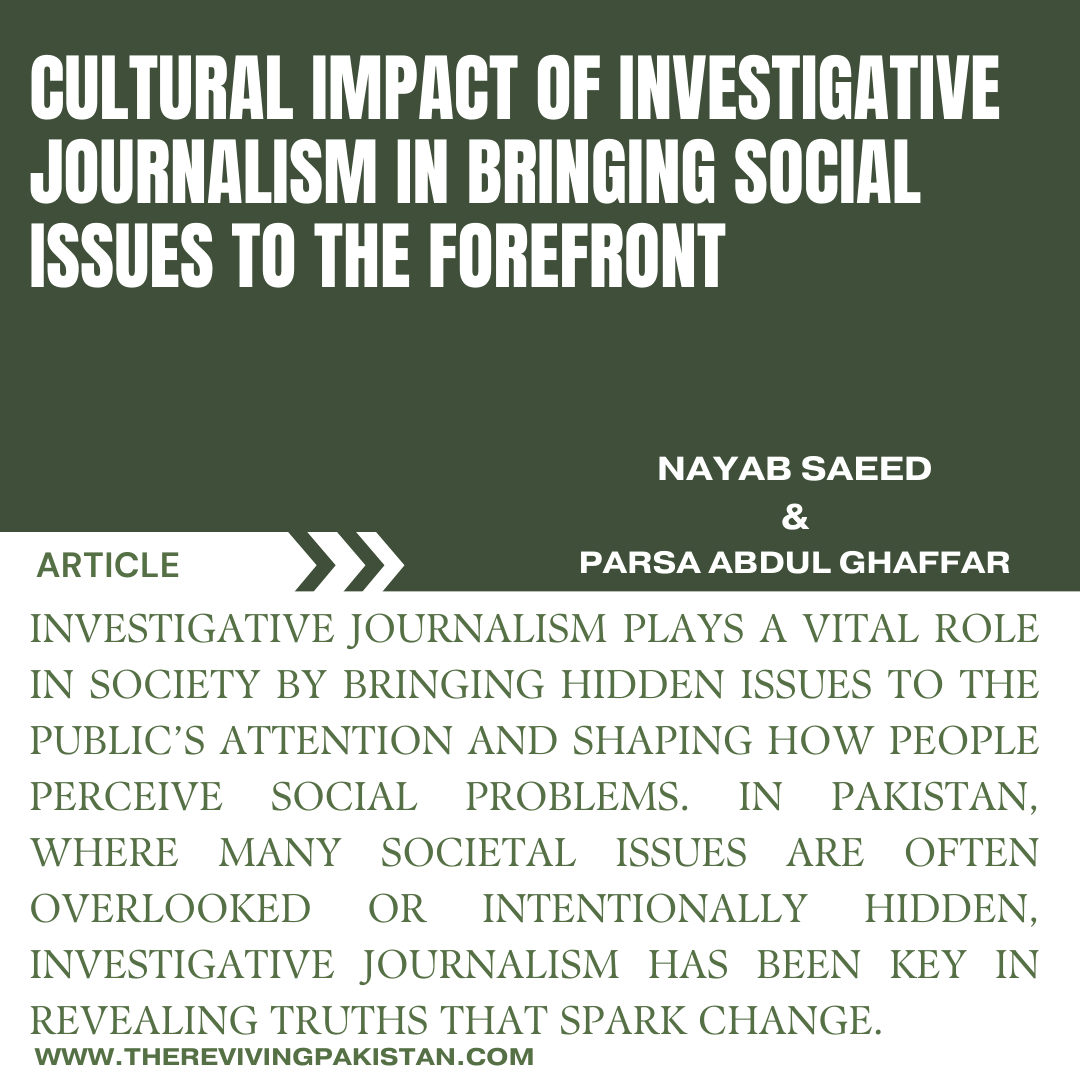Abou he Auhor(s)
Nayab Saeed and Parsa Abdul Ghaffar are dedicated students pursuing a Bachelor of Science in Physics at Fatima Jinnah Women University.
Investigative journalism plays a vital role in society by bringing hidden issues to the public’s attention and shaping how people perceive social problems. In Pakistan, where many societal issues are overlooked or intentionally hidden, investigative journalism has been vital in revealing truths that spark change. It’s not just about reporting the facts; it’s about challenging the status quo and digging deeper into the issues that affect everyday life.
One of the most significant examples of this is the case of Arshad Sharif, a prominent journalist who uncovered corruption within the country’s elite. His reporting went beyond the surface, showing how corruption was linked to many social issues, from economic inequality to weak governance. Sharif’s work showed how investigative journalism can uncover the root causes of social problems and push them into the public consciousness. His revelations led to widespread debates and, in many ways, forced authorities to address previously ignored issues. Another powerful example is the story of Qandeel Baloch, a social media star whose life and tragic death highlighted the deep-seated issue of honor killings in Pakistan. It was investigative journalists who pieced together the narrative of her life, exposing how cultural norms surrounding honor and shame played a role in her murder. Before this, honor killings were often considered a private family matter, but the investigation into Baloch’s death opened a larger discussion about women’s rights and societal expectations in Pakistan. Her case brought attention to a dark reality and forced many in Pakistan to rethink the cultural beliefs that allowed such tragedies to happen.
Investigative journalism doesn’t just uncover problems; it often leads to public action. When the media reports on an issue thoroughly and persistently, people are forced to confront it. A recent example of this is the investigation into the stolen malaria medicine scandal. This case revealed how essential medicine, meant to treat poor people suffering from malaria, was being siphoned off by corrupt officials. It wasn’t just about the theft of medicine—it showed how corruption can have a direct impact on public health. Because of the in-depth reporting on this issue, there was a national outcry, and the government was forced to take action. Investigative journalism played a crucial role in bringing this issue to light, pressuring the authorities to respond to public demand for justice.
The cultural Impact of investigative journalism in Pakistan also lies in how it shapes public opinion. When social issues are exposed in the media, they spark conversations among ordinary people. This dialogue often leads to a shift in how society views these issues. For example, before the case of Qandeel Baloch, many people in Pakistan either accepted or ignored honor killings. But after her story was told, there was a noticeable change in the way people talked about the issue. It became clear that such killings were not just personal or family matters but were symptomatic of larger cultural problems that needed to be addressed.
Investigative journalism has also highlighted issues such as child labor, environmental destruction, and political corruption. By exposing these problems, journalists challenge the cultural norms that allow them to continue. Child labor, for example, has been a persistent problem in Pakistan, with many families depending on the income their children bring in. However, investigative reports showing the harsh conditions and exploitation of these children have forced people to reconsider the acceptability of child labor. These reports have raised awareness about the importance of education and the long-term harm that child labor causes to both individuals and society. Investigative journalism can also change how people view their leaders. When journalists expose political corruption, it can break the cultural myth that politicians are untouchable.
In Pakistan, where many people feel disconnected from those in power, these reports can give citizens a sense of empowerment. They see that even the most powerful people in the country can be held accountable for their actions. This can lead to greater political engagement and a demand for transparency and honesty from public officials. Culturally, the role of investigative journalism cannot be understated. In a society like Pakistan’s, where traditions, honor, and social status are deeply embedded, investigative journalism often challenges these long-held norms. For example, reporting on women’s issues, such as domestic violence or harassment, goes against the grain of silence and acceptance that has historically surrounded these problems. Journalists have played a key role in pushing these issues into the spotlight, encouraging societal change by sparking uncomfortable but necessary conversations.
In conclusion, investigative journalism is not just about reporting—it’s about bringing the truth to light, challenging cultural norms, and inspiring change. In Pakistan, where many social issues are often hidden or ignored, investigative journalism has been essential in highlighting the problems that affect society the most. From corruption and honor killings to health scandals and child labor, the work of investigative journalists has a lasting cultural impact. It forces society to confront its problems and, hopefully, inspires solutions that can lead to a better future. Through their courage and dedication, investigative journalists in Pakistan continue to push the boundaries, ensuring that the stories that need to be told are heard by everyone.

